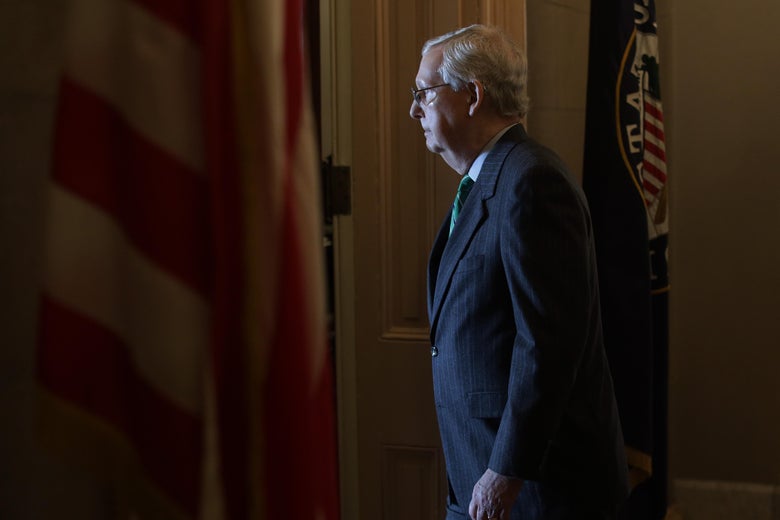
Pure trash, Mitch.
Alex Wong/Getty Images
Senate Republicans have now released their hotly anticipated proposal to send families direct cash payments, as part of a wider economic aid package aimed at combating the coronavirus crisis. And hoo boy is it disappointing.
Under the plan, the government would provide households an early tax rebate worth up to $1,200 for an individual or $2,400 for a married couple, with an extra $500 for each of their children. (So far, so good). The payments will be based on a household’s 2018 tax return, or if it didn’t submit one, their 2019 filing.
But the checks will shrink for both low- and high-earners. Americans with little-to-no tax liability—aka, poor folks—will only receive a minimum payment of $600, unless they earned less than $2,500, in which case they get zilch. My early reading of the bill is that low-wage workers who simply don’t file federal tax returns—adults generally aren’t required if they earn less than the standard deduction—also won’t qualify. (Seth Hanlon, a tax and budget expert at the Center for American Progress, agreed.) Meanwhile, the payments phase down for workers who make more than $75,000, and drop to zero for those making $99,000 and above (double those numbers for joint filers).
Limiting these payments for the upper-middle-class and up is defensible, even if it irritates commentators who’d prefer a more comprehensive approach that mimics a universal basic income. Penalizing the poor during a pandemic, however, is beyond the pale. We’re in the midst of a planned shutdown of the economy that will disproportionately harm low-wage service workers, and yet Republicans are concerned about properly rewarding people for work. It is a crass joke.
It’s worth emphasizing that the GOP’s new plan only calls for a single payment. The Trump administration had said its plan called for up to two, with the first arriving on April 6, and a second landing in mid-May if the crisis continued. This is not a proposal designed to provide ongoing support during an extended downturn—it’s essentially just a somewhat larger version of the tax rebate George W. Bush passed in his 2008 stimulus package. The bill does include a large loan program aimed at helping small businesses keep their workers on payroll, which if successful could reduce the number of Americans who end under financial stress. But the bill is, overall, fairly stingy with direct support for workers.
There was a lot of commotion this past week about how Republicans appeared to be embracing the idea of unconditional cash payments to all Americans, and even some anxiety on the left that, by insisting on means testing that would cut off the very rich, House Speaker Nancy Pelosi and the Democrats were being outflanked by the GOP on this issue. Those concerns seem to have been premature.
Readers like you make our work possible. Help us continue to provide the reporting, commentary and criticism you won’t find anywhere else.
Join Slate Plusfrom Slate Magazine https://ift.tt/2QwO6P9
via IFTTT
沒有留言:
張貼留言